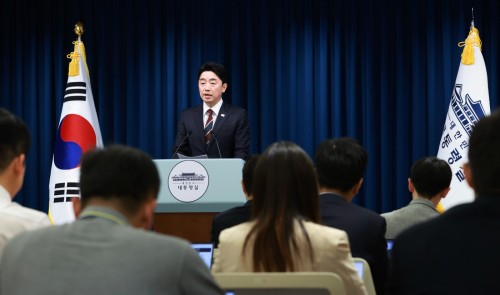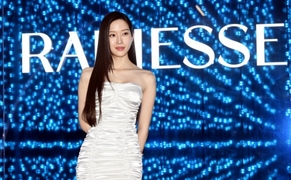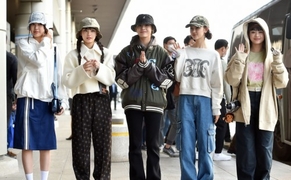 |
| Kang Hoon-sik, presidential chief of staff, announces appointments including the new Constitutional Court president and National Tax Service chief at the presidential office in Yongsan, Seoul, on June 26. / Source: Yonhap News |
President Lee Jae-myung on June 26 nominated Kim Sang-hwan, a former Supreme Court justice, as the next president of the Constitutional Court, and Oh Young-joon, a senior judge at the Seoul High Court, as a new Constitutional Court justice—both figures widely seen as progressive.
If confirmed, the appointments would shift the balance of the court, which currently consists of two progressives, three moderates, and two conservatives, toward a progressive majority.
Kim, a former member of the International Human Rights Law Research Society, and Oh, a member of the progressive-leaning "Judges for Democracy," are both expected to join the bench without major obstacles. While regular justices are appointed directly, the nomination of the court president also requires confirmation by the National Assembly. Given the majority held by the ruling Democratic Party, the approval process is expected to proceed smoothly.
Once appointed, the Constitutional Court would lean progressive, with two progressives (Jeong Gye-seon and Ma Eun-hyeok), three moderates (Kim Hyeong-du, Jeong Jeong-mi, and Kim Bok-hyeong), and two conservatives (Jeong Hyeong-sik and Cho Han-chang). With Kim and Oh joining, the bench would hold a 4–3 progressive advantage.
A progressive-leaning bench could help facilitate the passage of controversial bills backed by the government and ruling party, as it may be less likely to accept constitutional challenges from the opposition.
The shift is expected to deepen over time, as three more justices—all moderates or conservatives—are set to retire before President Lee’s term ends in June 2030. These include Kim Hyeong-du (March 2029), Jeong Jeong-mi (April 2029), and Jeong Hyeong-sik (December 2029).
The ideological tilt of the court could also influence the fate of key legislative proposals such as amendments to the Criminal Procedure Act and Public Official Election Act—dubbed the “Lee Jae-myung Shield Laws” by critics. These bills include clauses that could help the president avoid legal liability after his term.
Some in the legal community criticized the nominations as inconsistent with President Lee’s stated commitment to national unity.
“It’s hard to square these picks with the president’s emphasis on integration,” said one former prosecutor. “This feels like a case of favoring ideological allies. Hopefully, future nominations will better reflect a spirit of unity.”
Most Read
-
1
-
2
-
3
-
4
-
5
-
6
-
7





















